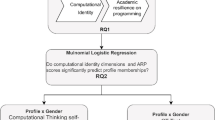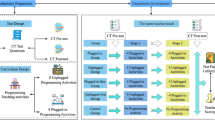Abstract
Computational thinking (CT) competency is essential for K-12 students in the digital societies. Understanding the relationship between students’ CT and relevant factors contributes to implementing and improving CT education. Most previous studies investigated the effect of demographic or attitudinal factors on CT performance; whereas few research explored the impact of mindset on CT, and how mindset potentially mediates the relationship between the affective and performance facets of CT. This study adapted a CT assessment instrument and validated it using item response theory (IRT) analysis and structural equation modeling (SEM) among N = 961 middle school students in eastern China. Further, two SEMs were fitted and compared to investigate the impact of programming self-efficacy (PSE) and growth mindset (GM) on CT performance. Results revealed that both programming self-efficacy and growth mindset positively predicted CT. Moreover, growth mindset positively mediated the relationship between PSE and CT. Findings suggest that mindset interventions beyond programming are also facilitative for improving CT.





Similar content being viewed by others
Data availability
The data that support the findings of this study are available from Shanghai Pujiang Program (Grant Number: 22PJC058), but restrictions apply to the availability of these data, which were used under licence for the current study and so are not publicly available. The data are, however, available from the authors upon reasonable request and with the permission of Shanghai Pujiang Program.
References
Akçay, N., Bircan, M. A., & Karakaş, H. (2023). The effect of STEM activities on primary school students’ attitudes towards STEM. International Journal of Research in Teacher Education, 14(2), 19–35. https://doi.org/10.29329/ijrte.2023.566.2
Asbell-Clarke, J., Rowe, E., Almeda, V., Edwards, T., Bardar, E., Gasca, S., Baker, R. S., & Scruggs, R. (2021). The development of students’ computational thinking practices in elementary- and middle-school classes using the learning game, Zoombinis. Computers in Human Behavior, 115. https://doi.org/10.1016/j.chb.2020.106587.
Bagozzi, R. P., & Yi, Y. (2011). Specification, evaluation, and interpretation of structural equation models. Journal of the Academy of Marketing Science, 40(1), 8–34. https://doi.org/10.1007/s11747-011-0278-x.
Bai, H., Wang, X., & Zhao, L. (2021). Effects of the problem-oriented learning model on middle school students’ computational thinking skills in a Python course. Frontiers in Psychology, 12, 771221. https://doi.org/10.3389/fpsyg.2021.771221.
Bandura, A. (1994). Self-efficacy. Encyclopedia of human behavior (Vol. 4, pp. 71–81). Academic.
Bandura, A. (1997). Self-efficacy: The exercise of control. Freeman.
Brennan, K., & Resnick, M. (2012). New frameworks for studying and assessing the development of computational thinking in 2012 Annual meeting of the American Educational Research Association.
Budsankom, P., Sawangboon, T., Damrongpanit, S., & Chuensirimongkol, J. (2015). Factors affecting higher order thinking skills of students: A meta-analytic structural equation modeling study. Educational Research and Reviews, 10(19), 2639–2652. https://doi.org/10.5897/err2015.2371
Burnette, J. L., Russell, M. V., Hoyt, C. L., Orvidas, K., & Widman, L. (2018). An online growth mindset intervention in a sample of rural adolescent girls. British Journal of Educational Psychologyl, 88(3), 428–445. https://doi.org/10.1111/bjep.12192.
Chevalier, M., Giang, C., El-Hamamsy, L., Bonnet, E., Papaspyros, V., Pellet, J. P., Audrin, C., Romero, M., Baumberger, B., & Mondada, F. (2022). The role of feedback and guidance as intervention methods to foster computational thinking in educational robotics learning activities for primary school. Computers & Education. https://doi.org/10.1016/j.compedu.2022.104431., 180.
Cronbach, L. J. (1951). Coefficient alpha and the internal structure of tests. Psychometrika, 16(3), 297–334. https://doi.org/10.1007/BF02310555.
CSTA, & ISTE (2011). CT leadership toolkithttps://cdn.iste.org/www-root/2020-10/ISTE_CT_Leadership_Toolkit_booklet.pdf.
Cutts, Q., Cutts, E., Draper, S., O’Donnell, P., & Saffrey, P. (2010). Manipulating mindset to positively influence introductory programming performance Proceedings of the 41st ACM technical symposium on Computer science education, Milwaukee, Wisconsin, USA. https://doi.org/10.1145/1734263.1734409.
Cutumisu, M. (2019). The association between feedback-seeking and performance is moderated by growth mindset in a digital assessment game. Computers in Human Behavior, 93, 267–278. https://doi.org/10.1016/j.chb.2018.12.026.
Cutumisu, M., Adams, C., Yuen, C., Hackman, L., Lu, C., & Samuel, M. (2019). Callysto Computational Thinking Test (CCTt) for Studentshttps://callysto.ca/
Dawson, J. Q., Allen, M., Campbell, A., & Valair, A. (2018). Designing an introductory programming course to improve non-majors’ experiences in Proceedings of the 49th ACM Technical Symposium on Computer Science Education, Baltimore, Maryland, USA. https://doi.org/10.1145/3159450.3159548.
Degol, J. L., Wang, M. T., Zhang, Y., & Allerton, J. (2018). Do growth mindsets in math benefit females? Identifying pathways between gender, mindset, and motivation. Journla of Youth Adolesc, 47(5), 976–990. https://doi.org/10.1007/s10964-017-0739-8.
del Olmo-Muñoz, J., Cózar-Gutiérrez, R., & González-Calero, J. A. (2020). Computational thinking through unplugged activities in early years of primary education. Computers & Education, 150. https://doi.org/10.1016/j.compedu.2020.103832.
Durak, H. Y., & Saritepeci, M. (2018). Analysis of the relation between computational thinking skills and various variables with the structural equation model. Computers & Education, 116, 191–202. https://doi.org/10.1016/j.compedu.2017.09.004.
Dweck, C. S. (2006). Mindset: The new psychology of success. Random House Incorporated.
El-Hamamsy, L., Zapata-Cáceres, M., Barroso, E. M., Mondada, F., Zufferey, J. D., & Bruno, B. (2022). The competent computational thinking test: Development and validation of an Unplugged Computational thinking test for Upper Primary School. Journal of Educational Computing Research, 60(7), 1818–1866. https://doi.org/10.1177/07356331221081753.
Ertmer, P. A., & Newby, T. J. (2013). Behaviorism, cognitivism, constructivism: Comparing critical features from an instructional design perspective. Performance Improvement Quarterly, 26(2), 43–71. https://doi.org/10.1002/piq.21143
Gov.UK. (2013). National curriculum in England: computing programmes of study. Retrieved May 22, 2023 from https://www.gov.uk/government/publications/national-curriculum-in-england-computing-programmes-of-study/national-curriculum-in-england-computing-programmes-of-study.
Grover, S., & Pea, R. (2013). Computational thinking in K–12. Educational Researcher, 42(1), 38–43. https://doi.org/10.3102/0013189x12463051.
Jiang, H., Islam, A. Y. M. A., Gu, X., & Guan, J. (2023). How do thinking styles and STEM attitudes have effects on computational thinking? A structural equation modeling analysis. Journal of Research in Science Teaching. https://doi.org/10.1002/tea.21899.
Kolyda, F. (2023). Fostering a growth mindset in higher education for inclusive learning for all. Journal of Learning Development in Higher Education, 27. https://doi.org/10.47408/jldhe.vi27.929.
Korkmaz, Ö., Çakir, R., & Özden, M. Y. (2017). A validity and reliability study of the computational thinking scales (CTS). Computers in Human Behavior, 72, 558–569. https://doi.org/10.1016/j.chb.2017.01.005.
Lai, C. H., Chen, Y. K., Wang, Y. H., & Liao, H. C. (2022). The study of learning computer programming for students with medical fields of specification-An analysis via structural equation modeling. International Journal of Environmental Research and Public Health, 19(10). https://doi.org/10.3390/ijerph19106005.
Lee, J., Lee, H. J., Song, J., & Bong, M. (2021). Enhancing children’s math motivation with a joint intervention on mindset and gender stereotypes. Learning and Instruction, 73. https://doi.org/10.1016/j.learninstruc.2020.101416.
Li, Q., Jiang, Q., Liang, J. C., Xiong, W., Liang, Y., & Zhao, W. (2023a). Effects of interactive unplugged programming activities on computational thinking skills and student engagement in elementary education. Education and Information Technologies. https://doi.org/10.1007/s10639-023-11634-7.
Li, W., Huang, J. Y., Liu, C. Y., Tseng, J. C. R., & Wang, S. P. (2023b). A study on the relationship between student’ learning engagements and higher-order thinking skills in programming learning. Thinking Skills and Creativity, 49. https://doi.org/10.1016/j.tsc.2023.101369.
Lodi, M., & Conference on International Computing Education Research. (2017). Growth mindset in computational thinking teaching and teacher training in Proceedings of the 2017 ACM, Tacoma, Washington, USA. https://doi.org/10.1145/3105726.3105736.
Lu, C., Macdonald, R., Odell, B., Kokhan, V., Epp, D., C., & Cutumisu, M. (2022). A scoping review of computational thinking assessments in higher education. Journal of Computing in Higher Education, 34(2), 416–461. https://doi.org/10.1007/s12528-021-09305-y.
Lye, S. Y., & Koh, J. H. L. (2014). Review on teaching and learning of computational thinking through programming: What is next for K-12? Computers in Human Behavior, 41, 51–61. https://doi.org/10.1016/j.chb.2014.09.012.
Ministry of Education of the People’s Republic of China. (2018). Information technology curriculum standards for general high school (2017 edition). People’s Education.
Ministry of Education of the People’s Republic of China. (2022). Information science and technology curriculum standards for compulsory education (2022 edition). Beijing Normal University.
OECD (2023a). PISA 2022 Assessment and Analytical Framework.
OECD (2019). PISA 2018 Results WHAT SCHOOL LIFE MEANS FOR STUDENTS’ LIVES (VOLUME III).
OECD, & Publishing, O. E. C. D. (2023b). PISA 2022 results (volume I): The State of Learning and Equity in Education. PISA. https://doi.org/10.1787/53f23881-en.
Relkin, E., de Ruiter, L. E., & Bers, M. U. (2021). Learning to code and the acquisition of computational thinking by young children. Computers & Education. https://doi.org/10.1016/j.compedu.2021.104222., 169.
Rizopoulos, D. (2006). Ltm: An R Package for Latent Variable modeling and Item Response Analysis. Journal of Statistical Software, 17(5), 1–25. https://doi.org/10.18637/jss.v017.i05.
Román-González, M., Pérez-González, J. C., & Jiménez-Fernández, C. (2017). Which cognitive abilities underlie computational thinking? Criterion validity of the computational thinking test. Computers in Human Behavior, 72, 678–691. https://doi.org/10.1016/j.chb.2016.08.047.
Román-González, M., Pérez-González, J. C., Moreno-León, J., & Robles, G. (2018). Extending the nomological network of computational thinking with non-cognitive factors. Computers in Human Behavior, 80, 441–459. https://doi.org/10.1016/j.chb.2017.09.030.
Rosseel, Y. (2012). Lavaan: An R Package for Structural equation modeling. Journal of Statistical Software, 48(2), 1–36. https://doi.org/10.18637/jss.v048.i02.
Selby, C. C., & Woollard, J. (2013). Computational thinking: The developing definitionhttp://people.cs.vt.edu/~kafura/CS6604/Papers/CT-Developing-Definition.pdf.
Shute, V. J., Sun, C., & Asbell-Clarke, J. (2017). Demystifying computational thinking. Educational Research Review, 22, 142–158. https://doi.org/10.1016/j.edurev.2017.09.003.
Sun, L., Hu, L., & Zhou, D. (2022a). Programming attitudes predict computational thinking: Analysis of differences in gender and programming experience. Computers & Education. https://doi.org/10.1016/j.compedu.2022.104457., 181.
Sun, L., Hu, L., & Zhou, D. (2022b). Single or combined? A study on programming to promote Junior High School Students’ computational thinking skills. Journal of Educational Computing Research, 60(2), 283–321. https://doi.org/10.1177/07356331211035182.
Tang, X., Yin, Y., Lin, Q., Hadad, R., & Zhai, X. (2020). Assessing computational thinking: A systematic review of empirical studies. Computers & Education. https://doi.org/10.1016/j.compedu.2019.103798., 148.
Tikva, C., & Tambouris, E. (2021). Mapping computational thinking through programming in K-12 education: A conceptual model based on a systematic literature review. Computers & Education. https://doi.org/10.1016/j.compedu.2020.104083., 162.
Tsai, M. J., Wang, C. Y., & Hsu, P. F. (2019). Developing the Computer Programming Self-Efficacy Scale for computer literacy education. Journal of Educational Computing Research, 56(8), 1345–1360. https://doi.org/10.1177/0735633117746747.
Tsai, M. J., Liang, J. C., & Hsu, C. Y. (2021). The computational thinking scale for computer literacy education. Journal of Educational Computing Research, 59(4), 579–602. https://doi.org/10.1177/0735633120972356.
Wei, X., Lin, L., Meng, N., Tan, W., Kong, S. C., & Kinshuk (2021). The effectiveness of partial pair programming on elementary school students’ computational thinking skills and self-efficacy. Computers & Education, 160. https://doi.org/10.1016/j.compedu.2020.104023.
Weintrop, D., Beheshti, E., Horn, M., Orton, K., Jona, K., Trouille, L., & Wilensky, U. (2016). Defining computational thinking for mathematics and science classrooms. Journal of Science Education and Technology, 25(1), 127–147. https://doi.org/10.1007/s10956-015-9581-5.
Wing, J. M. (2006). Computational thinking. Communications of the ACM, 49(3), 33–35. https://doi.org/10.1145/1118178.1118215.
Wing, J. M. (2010). Computational thinking: What and why?.
Zha, S., Jin, Y., Moore, P., & Gaston, J. (2020). A cross-institutional investigation of a flipped module on preservice teachers’ interest in teaching computational thinking. Journal of Digital Learning in Teacher Education, 36(1), 32–45. https://doi.org/10.1080/21532974.2019.1693941.
Zhao, W., & Shute, V. J. (2019). Can playing a video game foster computational thinking skills? Computers & Education. https://doi.org/10.1016/j.compedu.2019.103633., 141.
Acknowledgements
We would like to thank the support of Shanghai Pujiang Program (Grant Number: 22PJC058), Shanghai Jiao Tong University Social Science Youth Talent Cultivation Project (Grant Number: 2023QN010), and Shanghai Jiao Tong University New Faculty Startup Project (Grant Number: 22X010503470).
Author information
Authors and Affiliations
Corresponding author
Ethics declarations
Ethical approval
This study has been approved by the Ethics Board of Shanghai Jiao Tong University (IRB Approval: H20230367I).
Competing interests
Not applicable.
Additional information
Publisher’s Note
Springer Nature remains neutral with regard to jurisdictional claims in published maps and institutional affiliations.
Rights and permissions
Springer Nature or its licensor (e.g. a society or other partner) holds exclusive rights to this article under a publishing agreement with the author(s) or other rightsholder(s); author self-archiving of the accepted manuscript version of this article is solely governed by the terms of such publishing agreement and applicable law.
About this article
Cite this article
Wang, C., Lu, C., Chen, F. et al. Growth mindset mediates the relationship between computational thinking and programming self-efficacy. Educ Inf Technol (2024). https://doi.org/10.1007/s10639-024-12735-7
Received:
Accepted:
Published:
DOI: https://doi.org/10.1007/s10639-024-12735-7




